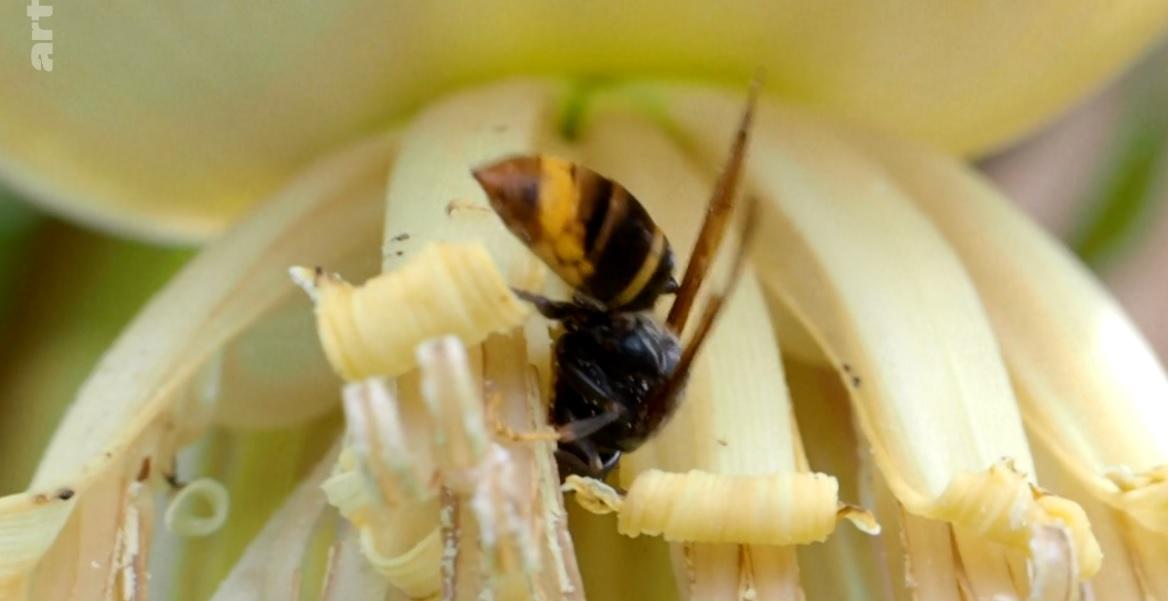
Date(s)
le 12 novembre 2025
14h
Lieu(x)
amphi 040 du bâtiment E1
"Sélection sexuelle post-copulatoire chez la mouche soldat noire (Hermetia illucens) : interactions tractus reproducteur femelle–sperme"/ "Post-copulatory sexual selection in the black soldier fly (Hermetia illucens): female reproductive tract–sperm"
Résumé : La sélection sexuelle est le processus au cours duquel un individu sélectionne un partenaire du sexe opposé pour assurer sa reproduction. Elle peut se poursuivre après l’accouplement pour l’accès aux gamètes, notamment à travers la compétition entre les spermatozoïdes des mâles et les choix cryptiques opérés par les femelles. Cette thèse vise à décrire les mécanismes de cette sélection sexuelle post-copulatoire chez la mouche soldat noire (Hermetia illucens), une espèce dont le stade larvaire suscite de nombreux intérêts économiques, mais dont le stade adulte reste peu étudié. Nous avons mis en évidence plusieurs adaptations potentielles du mâle à la compétition spermatique, parmi lesquelles figurent le transfert de protéines du fluide séminal et l’induction des réponses post-accouplement qui y sont associées, la production d’un bouchon spermatique induisant une préséance du sperme du premier mâle, ainsi que la plasticité de la production et de l’allocation des spermatozoïdes en fonction du risque de compétition spermatique. Finalement, nous avons montré que certains traits spermatiques pouvaient être perturbés par une infection virale, mettant en évidence un compromis entre reproduction et immunité pouvant modifier l’issue de la sélection sexuelle. Chez la femelle, nous avons montré que le stockage des spermatozoïdes constituait un processus long et complexe, caractérisé par une limitation imposée par la femelle ainsi que par une dégradation active de l’éjaculat dans un compartiment spécifique, suggérant une situation de conflit sexuel. Les résultats présentés dans ces travaux intègrent la mouche soldat noire à la recherche fondamentale en physiologie et biologie évolutive et entendent ainsi dépasser le cadre appliqué dans lequel cette espèce est le plus souvent confinée. Ce faisant, cette thèse pose des fondations solides qui pourront amener à une connaissance plus profonde de la reproduction de la mouche soldat noire.
Summary: Sexual selection is the process through which an individual secures a mate of the opposite sex to ensure reproduction. It can continue after mating before the access to gametes, notably via sperm competition among males and cryptic female choice; a process called “post-copulatory sexual selection”. This thesis aims to describe the mechanisms of post-copulatory sexual selection in the black soldier fly (Hermetia illucens) a species whose larval stage is of considerable economic interest, but whose adult stage remains poorly studied. We identified several potential male adaptations to sperm competition, including the transfer of seminal fluid proteins and the induction of associated post-mating responses, the production of a mating plug inducing first-male sperm precedence, as well as the plasticity of sperm production and allocation in relation to the risk of sperm competition. Finally, we showed that some of these traits could be disrupted by a viral infection, highlighting a trade-off between reproduction and immunity that may influence the outcome of sexual selection. In females, we showed that sperm storage is a long and complex process, characterized by a limitation imposed by the female as well as by an active degradation of the ejaculate within a specific compartment, suggesting a situation of sexual conflict. Overall, the results presented in this thesis position the black soldier fly within the framework of fundamental research in physiology and evolutionary biology, thereby moving beyond the predominantly applied framework in which this species has most often been confined. In doing so, this work lays solid foundations for a deeper understanding of black soldier fly reproduction.
Summary: Sexual selection is the process through which an individual secures a mate of the opposite sex to ensure reproduction. It can continue after mating before the access to gametes, notably via sperm competition among males and cryptic female choice; a process called “post-copulatory sexual selection”. This thesis aims to describe the mechanisms of post-copulatory sexual selection in the black soldier fly (Hermetia illucens) a species whose larval stage is of considerable economic interest, but whose adult stage remains poorly studied. We identified several potential male adaptations to sperm competition, including the transfer of seminal fluid proteins and the induction of associated post-mating responses, the production of a mating plug inducing first-male sperm precedence, as well as the plasticity of sperm production and allocation in relation to the risk of sperm competition. Finally, we showed that some of these traits could be disrupted by a viral infection, highlighting a trade-off between reproduction and immunity that may influence the outcome of sexual selection. In females, we showed that sperm storage is a long and complex process, characterized by a limitation imposed by the female as well as by an active degradation of the ejaculate within a specific compartment, suggesting a situation of sexual conflict. Overall, the results presented in this thesis position the black soldier fly within the framework of fundamental research in physiology and evolutionary biology, thereby moving beyond the predominantly applied framework in which this species has most often been confined. In doing so, this work lays solid foundations for a deeper understanding of black soldier fly reproduction.



